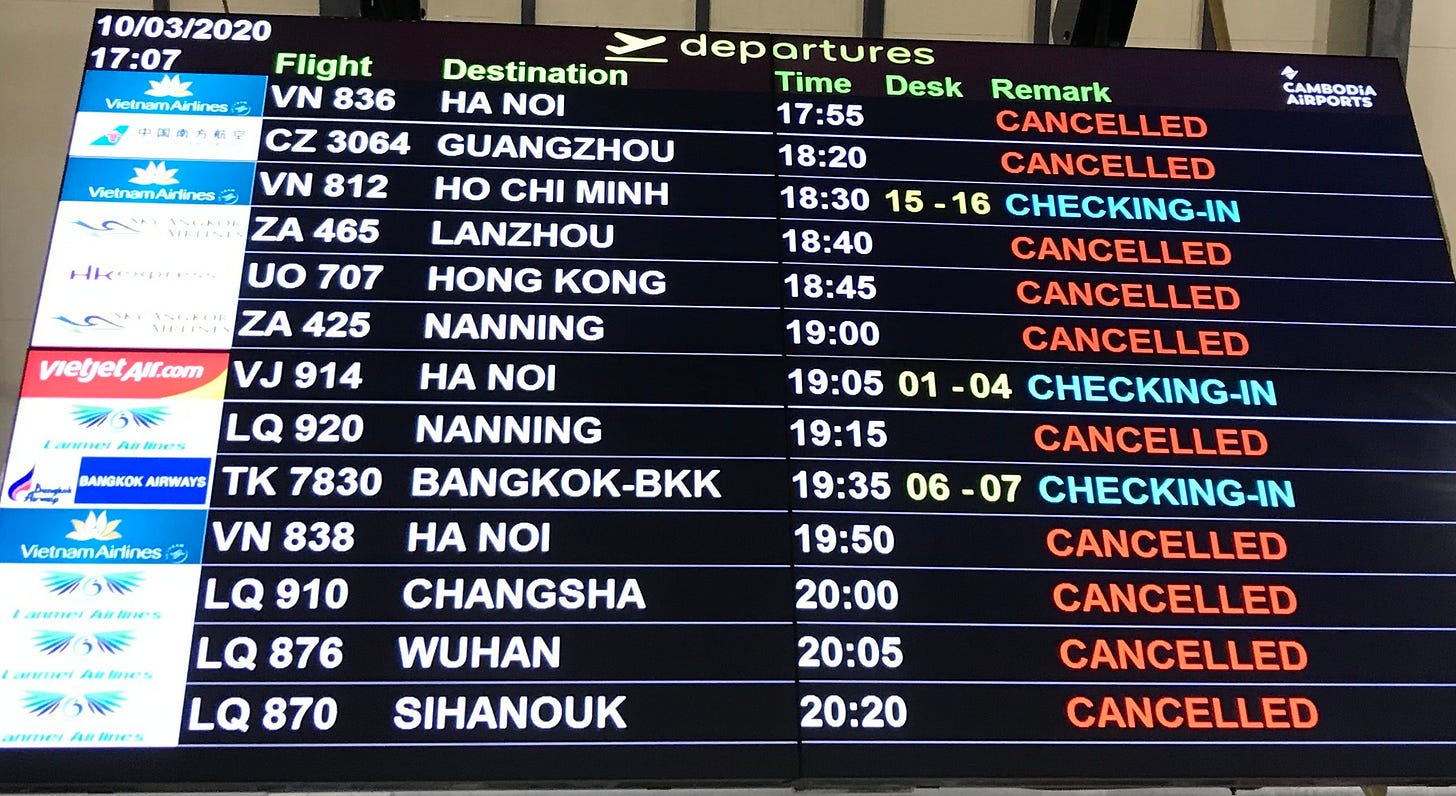⌂ My Dysfunctional Family Screwed Up: Here’s How to Protect Yours
On elder abuse and guardianship—the USA
Today, June 15, is World Elder Abuse Awareness Day. I’m taking this as an opportunity to share a tragic personal story that I hope will become a cautionary tale.
What Happened to My Family
In August 2020, my American mother-in-law died. Weeks later, my white wealthy father-in-law in Florida lost control of his life. Without his knowledge two women applied for guardianship over him and were appointed by the court. Overnight, he lost his civil rights.
While this went on in Florida, my husband and I were stranded in Vietnam due to the pandemic. The people who took care of my father-in-law communicated with us at first, but they kept it a secret they had become his guardians. The court, who could have easily tracked us down online, didn’t notify us either. We sensed, however, that something shifty was going on. We weren’t allowed to talk to my father-in-law (except for once) and received a serious warning from a concerned bystander to whom we remain forever grateful.
Still, what could we do? We had no proof of any misdoings and there were no safe flights to take us home.

I’m working on a book-length memoir about what happened next. It involves a private investigator, a typhoon, a damaging report from Adult Protective Services, a box of guns, stupendous attorney bills, sleepless nights, spiraling anxiety, endless peanut butter bagels, and a little bit of hard-won peace in the end.
Today, I’d like to focus on where we went wrong as a family, and what 7 steps you can take to protect your loved ones and yourself.
Where We Went Wrong
My American husband and I lived in Paris for over two decades. We were on good terms with his parents in Florida, spent two Christmas weeks together each year, and regularly spoke to one another on the phone. But we never talked about the practical and emotional subjects that mattered the most.
We didn’t discuss my father-in-law’s cognitive decline and how this put him at risk. We didn’t debate who would care for him if my mother-in-law died, or how she was physically already too fragile for the task. We knew they hadn’t updated their will in decades, yet we never brought up the inheritance for fear it would make us appear greedy. We never asked their opinions about end-of-life care because we knew it would make them uncomfortable. We never warned them that the isolation they chose as protection had the reverse effect and made them more vulnerable instead.
We respected my in-laws need for privacy, we told ourselves. They wanted us not to interfere. In reality, we skirted our responsibilities and accepted our family’s blind negligence as an irreversible fact. We ignored our worries. We pretended that our family’s traumatic past—silenced and repressed—wouldn’t complicate our future.
But we were wrong. We failed to take action when we still could. By believing things would magically work themselves out in the end, we made our family susceptible to abuse.
Don’t repeat our mistakes.
7 Steps to Protect Your Loved Ones and Yourself
You’re never too young to prepare for the worst. Accidents happen. Unforeseen situations will occur. Predators tend to strike when you’re defenseless. A pandemic or wild fire may cause havoc, and the people you (or your aging parent) normally rely on in case of an emergency may not arrive in time. Then what?
If you don’t want to lose control like my family did, I recommend the following 7 steps:
1. Talk about the subjects that matter the most
We tend to avoid what makes us uncomfortable. Discussing subjects such as money and longterm care can be stressful and invite conflict. Mentioning death will inevitably remind us of our own mortality. But not discussing such subjects leaves us unprepared when the unexpected happens. And can make expensive legal services necessary.
So organize meetings with the people you trust to express your wishes and arrangements. Discuss who should have the legal authority to make decisions in a hospital, for example, or run your finances when you cannot. Where do you want to live if you can no longer live alone and how will you afford it? Mention anything that might put you at risk for abuse, such as physical or cognitive decline. Have such talks regularly, so your plans and preferences stay up to date.
Illness, care, money, and mortality shouldn’t be taboos. Put them on the agenda.
2. Sign a durable power of attorney
Many people assume that their spouse, partner, or adult child will automatically be in charge of their affairs when they no longer have the capacity to make decisions on their own. But this is not true. Telling your loved ones what you want them to do in case of an emergency, gives them zero rights: Legally it’s no more than hearsay. Your loved ones may stand up for you, but without a written power of attorney, they have no legal authority. They may end up having no say over you or your assets whatsoever.
If the court considers you incapacitated, you can end up in the badly regulated government system known as guardianship. Your guardian may be someone who does not have your best interest at heart. They may try to steal your money or make life miserable for you in other ways.
It’s therefore essential to assign a durable power of attorney to a person you trust. This does not mean you immediately give up your agency. You will remain independent and able to act on your own. It just means that in case something happens to you, your trusted person (and not some random stranger) can make decisions on your behalf.
Visit the non-profit Free Will for more information.
3. Write your living will
A living will is a document that contains legal instructions to family members, doctors, and caregivers about medical decisions and end-of-life care. It details what you’d like to see happen in the event you become incapacitated. The document can mention subjects such as life support, tube feeding, resuscitation attempts (CPR), mechanical ventilation, and organ donations.
Visit the Mayo Clinic for more information.
4. Sign a a medical power of attorney and appoint a healthcare proxy
A medical power of attorney is the legal document in which you designate a healthcare proxy. A healthcare proxy is a person who has the authority to make medical decisions on your behalf in the event you’re unable to express your preferences. This person can use your living will as a guidance. It may be the same person you chose for your general power of attorney or someone else.
Visit the Cleveland Clinic for more information.
5. Write a last will and testament
A will states what should happen to your assets after you die and who should be in charge of paying off debts and distributing your wealth to your beneficiaries. Without a designated (and living) executor of the will, your estate will go into probate, a long and expensive process that’s best avoided. (Trust me.)
Visit the non-profit Free Will for more information.
6. Spread the word
We all care about privacy, but it’s wise to share the documents mentioned above with lawyers, doctors, friends, and family members. When you notify others of your choices in advance, you reduce the risk of conflict. It also becomes harder for documents to get lost or stolen.
7. Value your social network
Isolation makes us vulnerable. Strong social ties can give us support. Maintain healthy relationships with others as much as possible, and not only with close friends and family members. There may be people outside your intimate circle who you see on a more regular basis, such as neighbors, doctors, librarians, waiters, store attendants, and churchgoers. They can be like an alarm system. If these people know who your trusted person is, they can get in touch if they witness something suspicious.
The Takeaway
We cannot control life. We cannot stop criminals from scheming and scamming, but there are things we can do to protect ourselves.
My family’s story may seem exceptional, a one-of a kind horror show. But it’s unfortunately quite common as Sam Sugar writes in his book Guardianship and the Elderly: The Perfect Crime. What happened to us can easily happen to other (American) families.
If you don’t put in writing who should act on your behalf in case you become incapacitated, the court may assign you a guardian. You’ll have no control over who this person will be. Your spouse or adult child or trusted friend can apply for the job with the obligatory help of expensive lawyers, but there’s no guarantee the court will accept their application. The judge may appoint a total stranger instead.
Read that sentence again and let it sink in. I’m not exaggerating. Not deciding leaves a gap that can be abused. So please be proactive. Not deciding is deciding, too.
Desk Journeys
For a deep dive into the subject of this post, I recommend The Measure of Our Age: Navigating Care, Safety, Money, and Meaning Later in Life by elder justice expert M. T. Connolly (Hachette, 2023).
Contribute to the Conversation
Did something similar happen to your family? Do you have questions?
Time to Say Goodbye
Wander, Wonder, Write is a free travel newsletter with a focus on awe, mindfulness, and the world of writing. Thank you for reading about a totally different subject today.
Next time, we’ll be back in Japan. Are you ready for Nagasaki?
All my best,
Claire
P.S. Elder abuse is a public health and human rights issue that deserves more attention and funding. By sharing this post you will help raise awareness. Hearts (likes), comments, and restacks will help this post reach as many people as possible. I’m grateful for your support.
P.P.S. I usually publish my newsletter on Friday, but I sent it a day late as to be on time for Elder Abuse Awareness Day.






Claire, is there a happy ending to this story? Or did you accepted the situation in the end?
Thank you for writing this Claire! It's crazy how complicated and unjust this system is for elders and their families. To stand up against it, we must normalize the hard conversations you accurately described as taboo.